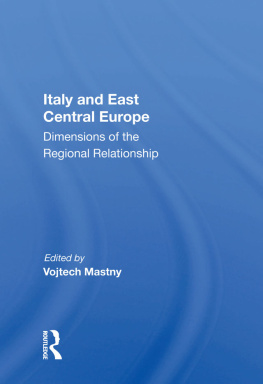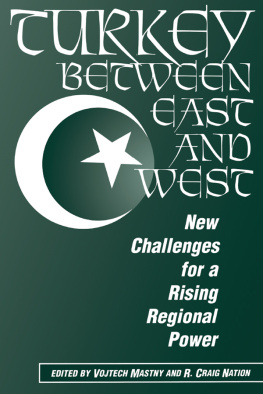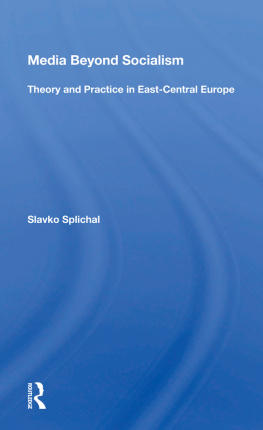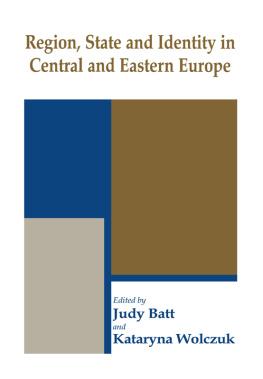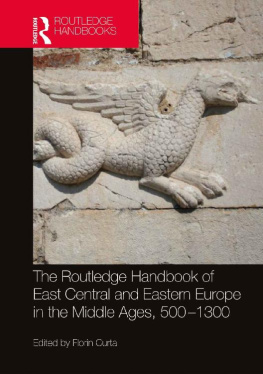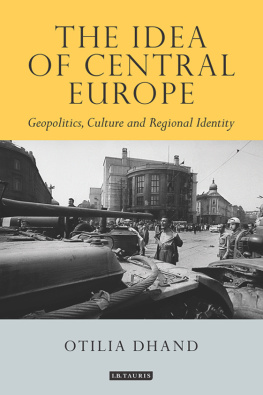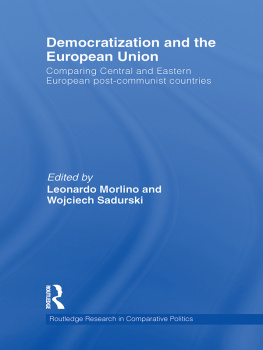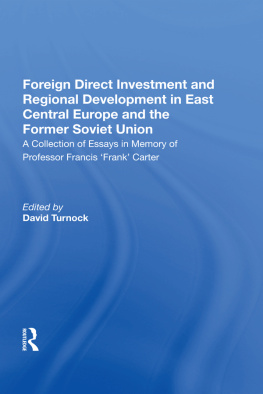First published 1995 by Westview Press, Inc.
Published 2018 by Routledge
52 Vanderbilt Avenue, New York, NY 10017
2 Park Square, Milton Park, Abingdon, Oxon OX14 4RN
Routledge is an imprint of the Taylor & Francis Group, an informa business
Copyright 1995 Taylor & Francis
All rights reserved. No part of this book may be reprinted or reproduced or utilised in any form or by any electronic, mechanical, or other means, now known or hereafter invented, including photocopying and recording, or in any information storage or retrieval system, without permission in writing from the publishers.
Notice:
Product or corporate names may be trademarks or registered trademarks, and are used only for identification and explanation without intent to infringe.
Library of Congress Cataloging-in-Publication Data
Mastny, Vojtech, 1936
Italy and East Central Europe : dimensions of the regional relationship / edited by Vojtech Mastny.
p. cm.
Includes bibliographical references and index.
ISBN 0-8133-8885-6
1. Europe, CentralRelationsItaly. 2. ItalyRelationsEurope, Central. 3. Europe, EasternEthnic relations. 4. European cooperation. I. Title.
DAW1045.18M37 1995
327.45043dc20
94-24013
CIP
ISBN 13: 978-0-367-01733-0 (hbk)
No other western European nation except Germany and Austria has been more deeply marked than Italy by the upheaval in east central Europe that ended the Cold War. For Germany, the events of 1989 brought the trauma of reunification; within five years, however, its internal course has unequivocally been set, as have been the terms of its primacy in the region. For Austria, the disappearance of the East-West confrontation created a crisis of national purpose after the nation's special brand of neutrality, aimed at rendering irrelevant the conflict between the two military blocs, had itself been made obsolete by events. But by 1995, too, the country had found a new purpose as a full-fledged member of the European Union. Only for Italy, the internal and external challenges generated by the collapse of communism remain unresolved. They entail the replacement of its corrupt political system, nourished for too long by its peculiar symbiosis with democratic Europe's most important communist party, and the definition of Italy's role in Europe, made more urgent by both the deepening integration of its western part and its irresistible widening by the eventual inclusion of parts of east central Europe.
The essays collected in this book examine the diverse aspects of what may be considered Italy's "special relationship" with east central Europe. They were originally prepared for a conference held in Bologna in 1992, when the prospects of Italy's playing a leading role in facilitating the formerly communist countries' "return to Europe" seemed most promising, but were re-written two years later to take account of the subsequent sobering developments. The keynote address delivered at the conference by Zbigniew Brzezinski, which alone is reprinted here in the original version, captured the spirit of the time by describing Italy as being best suited of all the major Western nations to interpret "the cultural content of modern democracy" to the peoples of central and eastern Europe. He was referring to the seriousness of Italy's search for a "creative affirmation" of the fundamental issues of Western society to which these peoples were seeking ways to belong.
That search subsequently led to the groundswell of discontent by the politically alert Italian electorate which shook the country's antiquated institutions and swept away its political establishment in a housecleaning comparable only to that which had previously disposed of eastern Europe's communist nomenklatura. Yet with the election in 1994 of the Berlusconi government, linked not only with the discredited establishment but also with the successor of the neo-fascist party, the promise of a new departure remained unfulfilled. The developments recalled once again the perennial theme of Italy's historic failure to respond to challenges at critical times despite great national exertionthe theme familiar to historians of the nineteenth-century unification movement, the Risorgimento, described by them as a turning point at which the nation failed to turn. Its inability to put its own house in order then fatally hampered its international performance as well.
In this historical perspective, which is explored in the introductory essay by Vojtech Mastny, Italy appears as having provided Europe in general and its east central part in particular with inspiration for both a universalist community of values and for national self-fulfillment which, however, was later distorted by chauvinism and eventually discredited by fascism. The universalist tradition was epitomized for centuries by Italy's being the center of Western Christianity, the particularist one by the Risorgimento. Among its protagonists, Giuseppe Mazzini's efforts to reconcile and integrate nationalism with regionalism and Europeanism ring an authentic note of relevance in today's Europe. His concept of federalism which safeguards ethnic identity brings a topical message especially to those peoples of east central Europe who after repudiating totalitarianism again face the danger of succumbing to nationalist intolerance.
The defects of Italian nationalism from World War I until the end of World War II offer persuasive object lessons of what should not be done in coping with that danger. The story of Italy's relations with east central Europe during this period is largely that of lost opportunities to establish a constructive and durable influence in the region. Sergio Romano discusses the sorry record of one of the continent's most sophisticated diplomatic establishments, handicapped not only by the persistent gap between the country's resources and its ambitions but also by the repeatedly wrong choice of priorities by its leaders.
Mussolini chose southeast Europe as the principal area of Italian expansionism, only to see the dominant role there pass on to Nazi Germany; he more successfully asserted Italian control of the German-speaking South Tyrol, thus making the eventual resolution of its minority question that much more difficult for many years to come. After its defeat in World War II, Italy turned away from the Balkans, where it faced a strong and hostile Yugoslavia, unsuccessfully trying to assert its influence in other parts of the Mediterranean instead. Initially tempted even to cultivate the Soviet connection as a counterweight to the Western powers, it became only later firmly integrated into the unifying Western Europe under American auspices.
Once on the road of economic prosperity as a dedicated member of both the European Community and the Atlantic alliance, Italy in the 1970s took the lead among the Western nations in establishing profitable commercial links with the countries of the Soviet bloc. In fostering an Italian presence there, businesspeople proved more far-sighted than the Rome politicians, who did not seek at that time to define and promote their country's role in the Soviet-controlled part of Europe. Instead, Italian diplomacy focused its attention on Tito's Yugoslavia just as his legacy was about to be repudiated and even on Enver Hoxha's Albania, as if the preservation of these regimes were in Italy's interest.

